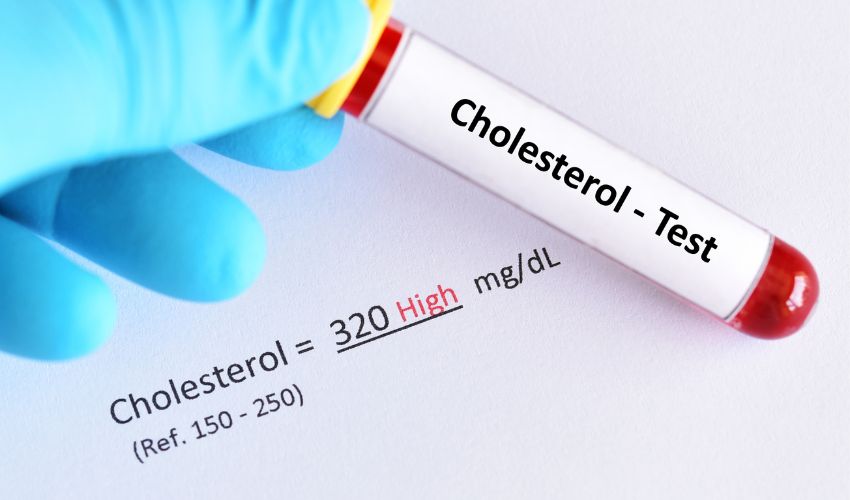High cholesterol is a common health problem that affects millions of people worldwide. It occurs when the levels of cholesterol in your blood are too high, which can increase your risk of heart disease and stroke. Cholesterol is a waxy substance that is produced naturally in your body, and it plays a vital role in various bodily functions. However, when the levels of cholesterol become too high, it can lead to a buildup of fatty deposits in your arteries, which can make it difficult for blood to flow through them. In this article, we will explore the causes, symptoms, and treatment options for high cholesterol.
Causes of High Cholesterol:
There are several factors that can contribute to high cholesterol levels, including:
- Poor diet: A diet that is high in saturated and trans fats can increase your cholesterol levels.
- Lack of exercise: Physical inactivity can lead to weight gain, which can also increase your cholesterol levels.
- Genetics: High cholesterol can run in families, and some people may be genetically predisposed to the condition.
- Age and gender: Cholesterol levels tend to increase with age, and men are more likely than women to have high cholesterol.

Types of Cholesterol:
Cholesterol is carried in the blood by particles called lipoproteins. There are two types of lipoproteins that carry cholesterol:
- Low-density lipoprotein (LDL) cholesterol: This is known as the “bad” cholesterol because it can build up in the walls of your arteries and form plaques, which can narrow your arteries and increase your risk of heart disease and stroke.
- High-density lipoprotein (HDL) cholesterol: This is known as the “good” cholesterol because it helps to remove LDL cholesterol from your arteries and transport it to the liver, where it can be eliminated from your body.
The Impact of High Cholesterol on Your Health:
High cholesterol levels can increase your risk of several health problems, including:
- Heart disease: High cholesterol can cause fatty deposits to build up in your arteries, which can increase your risk of heart attacks and other heart diseases.
- Stroke: High cholesterol can also cause a buildup of fatty deposits in the arteries that supply blood to your brain, which can increase your risk of stroke.
- Peripheral arterial disease: High cholesterol can cause a buildup of fatty deposits in the arteries that supply blood to your legs, which can cause pain, numbness, and other problems.
Lifestyle Changes to Lower Your Cholesterol Levels:
Making changes to your diet and exercise habits can help to lower your cholesterol levels. Some lifestyle changes that you can make include:
- Eating a heart-healthy diet: This means eating plenty of fruits, vegetables, whole grains, lean proteins, and healthy fats.
- Exercising regularly: Aim to get at least 150 minutes of moderate-intensity exercise per week.
- Quitting smoking: Smoking can increase your cholesterol levels and increase your risk of heart disease and stroke.
- Managing your weight: Being overweight or obese can increase your cholesterol levels, so maintaining a healthy weight is important.
Medications to Lower Your Cholesterol Levels:
There are several medications available that can help to lower your cholesterol levels, including:
- Statins: These are the most commonly prescribed medications for high cholesterol. They work by blocking the production of cholesterol in your liver.
- Bile acid sequestrants: These medications work by binding to bile acids in your gut, which can help to remove cholesterol from your body.
- PCSK9 inhibitors: These medications work by blocking a protein in your liver that can cause your body to produce more cholesterol.
Supplements to Lower Your Cholesterol Levels:
Some supplements may help to lower your cholesterol levels, including:
- Plant sterols and stanols: These substances can help to block the absorption of cholesterol in your gut.
- Omega-3 fatty acids: These can help to reduce inflammation in your body and lower your triglyceride levels.
- Psyllium: This is a type of fiber that can help to lower your LDL cholesterol levels.
Symptoms of High Cholesterol:
High cholesterol does not usually cause any symptoms, which is why it is often referred to as a silent killer. However, if left untreated, high cholesterol can lead to serious health problems, such as heart disease and stroke.

Treatment Options for High Cholesterol:
If you have high cholesterol, your doctor may recommend the following treatment options:
- Lifestyle changes: Making changes to your diet and exercise habits can help to lower your cholesterol levels.
- Medications: There are several medications available that can help to lower your cholesterol levels, such as statins.
- Supplements: Some supplements, such as plant sterols and stanols, can help to lower your cholesterol levels.
FAQs:
Can high cholesterol be reversed?
Yes, high cholesterol can be reversed through lifestyle changes and medications.
What are the long-term effects of high cholesterol?
High cholesterol can increase your risk of heart disease, stroke, and other health problems.
How often should I have my cholesterol checked?
It is recommended that adults have their cholesterol checked at least once every five years.
Are there any natural remedies for high cholesterol?
Some natural remedies, such as garlic, omega-3 fatty acids, and psyllium, may help to lower your cholesterol levels.
Can high cholesterol be prevented?
Yes, high cholesterol can be prevented through lifestyle changes, such as eating a healthy diet and exercising regularly.
Conclusion:
High cholesterol is a serious health condition that can lead to serious health problems if left untreated. By making lifestyle changes, taking medications, and using supplements, you can lower your cholesterol levels and reduce your risk of heart disease and stroke. If you have high cholesterol, it is important to work with your doctor to develop a treatment plan that is right for you.






















